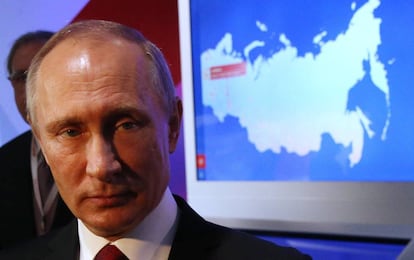Romanian eurodeputy: “Catalonia is another case of malicious Russian meddling”
A group of experts is calling on Brussels to take tougher action to counter authoritarian propaganda

A growing number of voices within Europe is raising concerns over Russian meddling in the Catalan crisis: a phenomenon that comes in the wake of similar interference in the German elections, the Dutch Ukraine-European Union Association Agreement referendum, and even in the Brexit vote.
Romanian Eurodeputy Victor Bostinaru says he has evidence of this Russian interference in favor of Catalan independence.
“Catalonia is another case of malicious interference. Intelligence community data confirms that at least some of the hackers behind certain online campaigns were in Russia,” says Bostinaru, who is vice-chair with the Socialists and Democrats group in the European Parliament.
Signatories of the Prague Declaration are calling for the EU to seriously boost efforts to counter Russian propaganda
“We mustn’t be naive: behind these words and slogans in favor of independence there are hidden motives,” he warns.
Bostinaru, a historian, defends the measures – such as the application of Article 155 of the Constitution and the subsequent sacking of the Catalan government – that Spain has taken in the face of the secessionist challenge from Catalonia. “A state is fully within its rights to use all of the resources it has at hand to guarantee the territorial integrity of the country,” he says.
The eurodeputy highlights that it’s not just smaller European countries that are being targeted by Moscow’s attempts at destabilization. “It’s clear that the European Union has not been sufficiently prepared to face this new threat: a lot more has to be done,” he says.
The Socialists and Democrats group in the European parliament has drawn up a strategy to reinforce European defense, with boosting cybersecurity a cornerstone of the plan.
Bostinaru is not alone in pushing Brussels to adopt tougher measures: Eurodeputies and experts from more than 20 countries have signed the so-called Prague Declaration, which calls on the EU’s foreign policy chief Federica Mogherini to take more forceful action in cases like that of Catalonia. The lion’s share of the people who have put their name to this document are from Eastern Europe and are more aware of the attempts at destabilization on the part of Russia. But this group also includes US academics and analysts.
We mustn’t be naive: behind these words and slogans in favor of independence there are hidden motives Eurodeputy Victor Bostinaru
“Whereas the United States is investigating a clearly hostile penetration of its utmost democratic sanctuary – meddling with the election process – no such investigation has been initiated anywhere in Europe,” the document notes.
“This remains a fact even though there were clear cases of blatant Russian meddling in the Dutch referendum, the British referendum, the Italian referendum, the French elections and, most recently, the German elections and the Catalan referendum,” the declaration also warns.
The signatories have demanded urgent measures including tripling the strength of the East Stratcom Task Force, an agency set up by the EU in 2015 to counter Russian disinformation but which currently counts on only limited resources. They also are calling for greater cooperation between European countries and NATO. At present, the EU and NATO work together but still too slowly to tackle the huge challenge faced.
European foreign affairs ministers on Wednesday raised the issue of the need to bolster the East Stratcom Task Force. All member states agreed on the need to do so, according to sources. However, with member states having to foot the bill for any such move, there remains a lack of will to sign off on a deal that would make this proposal a reality.
English version by George Mills.
Tu suscripción se está usando en otro dispositivo
¿Quieres añadir otro usuario a tu suscripción?
Si continúas leyendo en este dispositivo, no se podrá leer en el otro.
FlechaTu suscripción se está usando en otro dispositivo y solo puedes acceder a EL PAÍS desde un dispositivo a la vez.
Si quieres compartir tu cuenta, cambia tu suscripción a la modalidad Premium, así podrás añadir otro usuario. Cada uno accederá con su propia cuenta de email, lo que os permitirá personalizar vuestra experiencia en EL PAÍS.
¿Tienes una suscripción de empresa? Accede aquí para contratar más cuentas.
En el caso de no saber quién está usando tu cuenta, te recomendamos cambiar tu contraseña aquí.
Si decides continuar compartiendo tu cuenta, este mensaje se mostrará en tu dispositivo y en el de la otra persona que está usando tu cuenta de forma indefinida, afectando a tu experiencia de lectura. Puedes consultar aquí los términos y condiciones de la suscripción digital.









































